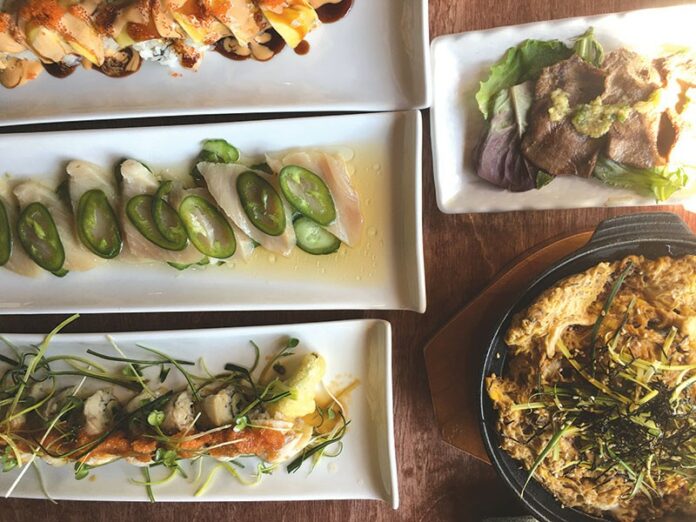When an American Japanese restaurant calls itself an izakaya, it often alludes to the casual, informal atmosphere of the place, rather than the menu itself—crowd-pleasing standards like sushi rolls, ramen and udon will be offered.
But the traditional premise of an izakaya is small dishes showcasing the diversity of Japanese cuisine. Petaluma’s newish Izakaya Kitaru offers a range of dishes to justify the tag.
And yet, from the outside, Kitaru seems like a middle-of-the-road Japanese spot, and the interior is no surprise either. Dark wood dominates the space, and two large TVs cancel all hopes for escapism or intimacy.
Stay away from the screens and start with the small plates. We ordered the eryngi tempura, deep-fried king oyster mushrooms ($8) and albacore carpaccio ($15). The tender and generous albacore tuna slices were swimming in a light ponzu sauce and adorned with crispy cucumbers and fresh jalapeno; the crunch and spice highlighted the texture of the fish. It wasn’t a memorable dish, but it did have a straightforward, no-frills execution—rare these days when it comes to crudo and carpaccio.
The mushrooms were similarly simple, yet telling of the kitchen’s attention to detail. The choice of king oysters resulted in a complexity of textures, as the chewy, meaty mushroom was enveloped in soft, golden tempura. We asked for a dipping sauce and were instead advised to dip the nuggets in the truffle salt they were served with. The umami flavor intensified, and the dish was elevated to the next level.
The $10 beef tongue, from the kushiyaki (grilled-items) section, was a standout. Widely served cold in Russian cuisine and griddled in Mexican lengua tacos, the tongue was made new at Kitaru: sliced ultra-thin, grilled and topped with punchy garlic and herb purée. Again, a simple, well-prepared ingredient was complemented by a smart flavor kick. Next came unatama yakimeshi ($17), a dish of fried rice made with barbecued eel, egg and fried onion. The sizzling mixture resembled an airy souffle. The eel’s sweet, oily flesh and the whipped egg was layered with perfectly cooked rice and strings of caramelized onion.
Finally, we were curious to see if Izakaya Kitaru’s genius extends to the well-traveled avenue of sushi rolls. The aburi saba ($14) and the Red Tiger ($16) rose above the other rolls on offer with interesting ingredient combinations. The aburi saba featured tempura scallion and avocado on the inside, and mackerel on the outside. The mackerel was lightly briny and pungent, not quite raw but pickled, and the daikon-hot sauce garnish added a fresh acidity to the plate.
The Red Tiger went for a more traditional marriage of snow-crab salad, mango and fish eggs. The rolls balanced their sweet and salty components; the two sauces drizzled on top, teriyaki and spicy mayo, turned a humble roll into a festive, juicy affair.
The same could be said of the restaurant itself: unassuming upon arrival, but brimming with flair and imagination.











